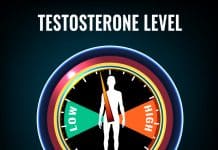An FDA mandated warning on all testosterone products states that testosterone replacement therapy (TRT) in men with benign prostate hyperplasia (BPH) “increases the risk of worsening signs and symptoms of BPH”. This warning appears to be based off the commonly held notion that prostate growth is proportional to testosterone levels, despite evidence to the contrary. In this review article we explored BPH/LUTS and its interplay with testosterone. This included an overview of the physiology of testosterone interactions with the prostate and lower urinary tract, as well as a review of literature pertaining to TRT’s effects on LUTS/BPH.
In terms of physiology, testosterone actually appears to be beneficial for the prevention of LUTS/BPH.1,2 Studies have suggested three major contributors to LUTS/BPH: nitric oxide deficiency, autonomic hypertonicity, and pelvic atherosclerosis. Among other things, these entities result in pelvic ischemia and chronic hypoxia of the bladder and prostate, which has been associated with LUTS/BPH.3-6 Sharing a similar pathway with phosphodiesterase-5 (PDE-5) inhibitors, testosterone has been shown to alleviate this hypoxia by modulating cGMP-mediated nitric oxide production.7-10

















